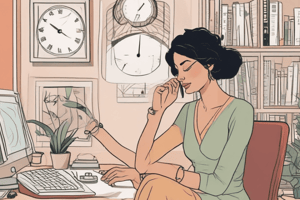Podcast
Questions and Answers
How are camera angles used in the basement scene?
How are camera angles used in the basement scene?
The filming feels threatening because Chris looks small and insignificant due to the high angle camera shot, and the close-ups reveal his fear.
How are camera angles used to show guilt when Chris is talking about his mum?
How are camera angles used to show guilt when Chris is talking about his mum?
Close-up shots showcase Chris's discomfort and body language when discussing his mother.
How is sound/music used in the hypnotizing scene?
How is sound/music used in the hypnotizing scene?
Non-diegetic piano music foreshadows the hypnosis and creates discomfort, while diegetic sounds highlight Chris's unease.
How is music used during the sunken place?
How is music used during the sunken place?
What is the song used in the first scene called and what does it symbolize?
What is the song used in the first scene called and what does it symbolize?
What camera angle is used when Chris is crying in the hypnosis scene and why is it used?
What camera angle is used when Chris is crying in the hypnosis scene and why is it used?
What camera angle is used when Chris is gripping the chair in the hypnosis scene and why is it used?
What camera angle is used when Chris is gripping the chair in the hypnosis scene and why is it used?
What does the teacup symbolize in the film 'Get Out'?
What does the teacup symbolize in the film 'Get Out'?
How is the teacup used as a weapon in the film?
How is the teacup used as a weapon in the film?
What does cotton symbolize in 'Get Out'?
What does cotton symbolize in 'Get Out'?
What does the sunken place represent in the film?
What does the sunken place represent in the film?
What do deer symbolize in the context of the Armitage family?
What do deer symbolize in the context of the Armitage family?
How does the Armitage house represent deeper themes in 'Get Out'?
How does the Armitage house represent deeper themes in 'Get Out'?
What do the cars symbolize when the extended Armitage family arrives?
What do the cars symbolize when the extended Armitage family arrives?
What is the significance of the quote 'I Want Your Eye, Man'?
What is the significance of the quote 'I Want Your Eye, Man'?
What does Dean's quote 'By The Way, I Would Have Voted For Obama For A Third Term, If I Could.' reveal?
What does Dean's quote 'By The Way, I Would Have Voted For Obama For A Third Term, If I Could.' reveal?
How is music, especially harps, used in the film?
How is music, especially harps, used in the film?
How do camera angles contribute to the unease felt when Chris and Rose arrive at the Armitage estate?
How do camera angles contribute to the unease felt when Chris and Rose arrive at the Armitage estate?
Flashcards are hidden until you start studying
Study Notes
Symbolism of the Teacup and Spoon
- The teacup hypnotizes Chris, representing manipulation and control of black individuals by white power holders.
- Silver spoon symbolizes class, civility, and generational privilege, highlighting the Armitage family's wealth, particularly their white privilege.
- The phrase "born with a silver spoon in their mouth" illustrates the Armitage family's inherited wealth, contrasting with their exploitation of Chris.
- The china teacup represents the family's affluence, with china typically associated with wealth.
Symbolism of the Teacup Part 2
- The teacup recalls slave masters summoning slaves, with Missy's use of it symbolizing Chris's eventual subjugation.
- As a weapon, the teacup and spoon initially seem benign but ultimately entrap Chris into the "sunken place," illustrating false security leading to real danger.
Overview of Get Out
- "Get Out," directed by Jordan Peele, is a satirical horror film centered on Chris’s unsettling visit to his girlfriend Rose's family home, revealing sinister underpinnings.
Symbolism of Cotton
- Cotton symbolizes the historical oppression of African Americans; Chris uses it to escape, showcasing racial irony by turning a symbol of suffering into a source of strength.
Symbolism of the Sunken Place
- The "sunken place" serves as a metaphor for black marginalization and silencing, reflecting societal power dynamics where autonomy is stripped from black individuals.
- Jordan Peele states that the sunken place illustrates systemic racism silencing black voices.
Symbolism of Deers
- Deers symbolize the Armitage family's view of black people as trophies; they hunt and display them while justifying their actions as pest control.
- Dean’s remarks on deer showcase a metaphor for how some view people of color negatively within their communities.
- Dean’s death by a deer head symbolizes the ironic consequence of his prejudiced views.
Symbolism of Deers and Guilt
- The deer represents Chris’s guilt related to his mother's death; his instinct to save the deer mirrors his feelings of helplessness.
- The basement scene featuring deer heads symbolizes confronting and overcoming guilt as Chris uses it to defend himself against Dean.
Symbolism of the Armitage House
- The estate appears idyllic, masking deeper horrors and reflecting a plantation's legacy with black characters symbolizing past slavery.
- Dean's collection of cultural artifacts reveals cultural appropriation and the power dynamics held by whites over black culture.
Symbolism of Cars
- The black cars with white interiors signify the Armitage family's objective of transferring white consciousness into black bodies, creating an ironic visual.
- Chris and Rose's red car symbolizes danger, with Rose driving indicating the power she holds in leading Chris into peril.
Symbolism of the White Car/Knight
- Jeremy's knight's helmet symbolizes a deceptive facade of chivalry and the Armitage family’s sinister true intentions.
- The white color is linked to purity, enhancing the irony of their horrific actions hidden beneath an innocent exterior.
Symbolism of Knight and Supremacy
- The knight’s helmet references white supremacy, connecting to historical and modern racial dominance themes in the film.
- Jordan Peele's commentary links the villains' lineage to the Knights Templar, emphasizing their belief in superiority.
Quotes from the Film
- Jim Hudson's quote, "I Want Your Eye, Man," reveals his envy for Chris’s talent, emphasizing the exploitation theme and the loss of identity.
- Dean's phrase "my man" illustrates the superficial kindness masking underlying racism, indicating white liberal ignorance.
- "Black Is In Fashion" reflects the dehumanizing attitude of some whites, reducing the rich complexity of black identity to mere trends.
- Andre's shout, "Get Out!" serves as both a warning and a foreshadowing of Chris's reality, signifying ignored cries of black individuals throughout history.
Significance of Dean's Monologue on Deer
- Dean's opinion reveals his rigid view of racial issues, portraying black people as pests and reflecting societal attitudes of objectification and racism.
Chris's Fears Regarding Race
- Chris's concern about being chased off with a gun reveals the deep-rooted fears of violence that black individuals experience due to systemic racism, linking to the film's climax.
Dean's Quote on Liberalism
- Dean's declaration of voting for Obama attempts to present himself as progressive while highlighting white saviorism and performative allyship.
Use of Music in the Film
- Harp music establishes an eerie ambience, mirroring Chris's subconscious discomfort around white individuals while enhancing the film's unsettling atmosphere.
Sound and Music for Jump Scares
- The structured buildup before jump scares uses crescendos to create tension, keeping audiences on edge as suspense unfolds.
Camera Angles in the Armitage Estate Arrival
- The distant camera work during Chris and Rose's arrival enhances unease, emphasizing isolation and foreshadowing the dangers within the estate.
Camera Angles in the Basement Scene
- High-angle shots make Chris appear small and powerless, underlining his vulnerability, while close-ups of his fear convey the threat he faces.
Camera Angles to Show Guilt
- Close-ups on Chris’s discomfort while discussing his mother emphasize his vulnerability and guilt, culminating in a focus on the teacup and spoon at the scene's end.### Sound and Music in Hypnotic Scenes
- Non-diegetic piano music introduces the first conversation with Chris's parents, creating an emotional backdrop.
- The same piano melody reappears when Missy discusses his mother, foreshadowing her hypnotic manipulation.
- Diegetic sound of Chris scratching the sofa reflects his discomfort discussing his mother, enhancing audience empathy.
- High pitch of the music combined with the focused diegetic sound deepens the unsettling atmosphere.
- Rain symbolizes Chris's childhood emotions, fostering viewer empathy and illustrating his experiences as a Black individual.
Music in the Sunken Place
- Organ music is used in the sunken place scene to evoke feelings of hopelessness, traditionally linked with funeral settings.
- This choice amplifies the ominous mood, emphasizing the dread of Chris's situation.
Symbolism of "Run Rabbit Run"
- The song "Run Rabbit Run" establishes a predator-prey dynamic between Chris, Andre, and the Armitage family.
- Opens the film with a sense of foreboding, drawing the audience into the impending abduction of Andre.
- Functions as foreshadowing for Chris’s upcoming dangers, highlighting themes of objectification and racial power imbalances in America.
Camera Angles in Emotional Scenes
- An extreme close-up of Chris's face while he cries conveys his profound emotional struggle and helplessness, depicting his psychological state during hypnosis.
Close-up of Chris Gripping the Chair
- A close-up of Chris's hands gripping the chair and nervously picking at the fluff serves multiple purposes.
- This moment foreshadows his inability to resist the Armitages' hypnosis as he uses cotton to block out sound.
- The cotton symbolizes historical references to slavery and plantations, linking the characters' experiences to broader racial narratives.
Studying That Suits You
Use AI to generate personalized quizzes and flashcards to suit your learning preferences.




